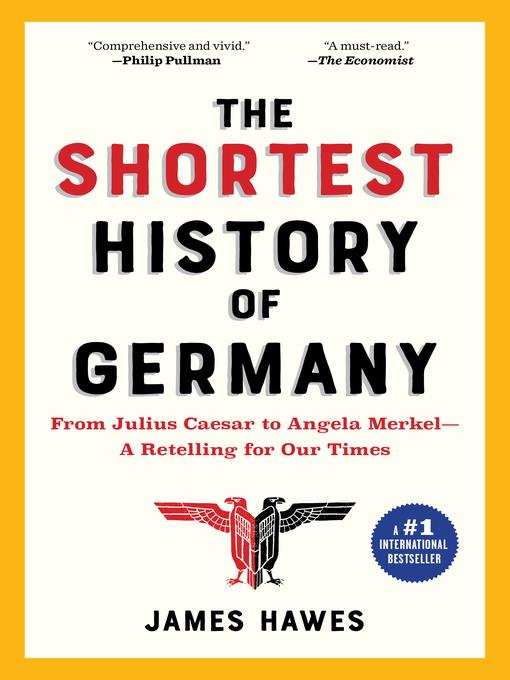
The Shortest History of Germany
From Julius Caesar to Angela Merkel—A Retelling for Our Times
کتاب های مرتبط
- اطلاعات
- نقد و بررسی
- دیدگاه کاربران
نقد و بررسی

January 1, 2019
A fast-moving encapsulation of German history focusing on the thesis that Prussia's aggression was a short-lived anomaly in the big picture and not reflective of the true German spirit.German-steeped British academic Hawes (Creative Writing/Oxford Brookes Univ.; Englanders and Huns: The Culture-Clash Which Led to the First World War, 2014, etc.) imparts plenty of useful information in this handy history for students looking to define a sometimes-inscrutable people with a tainted recent past. At the beginning, the author implores readers to "throw away a great deal of what we think we know about German history, and start afresh." First, he reminds us that "Julius Caesar had invented the Germans," that is the barbarians who lived east of the Rhine who differed greatly from the Romans, who, according to Tacitus, "had degenerated into a people made soft by vice and luxury, who merely groveled to their emperors." Hence the beginning of the rather romantic character of Germans as wild and noble tribesmen on the frontiers. Hawes sees the birth of Germany as we know it with the partition of Charlemagne's kingdom into West Frankish (France) and East Frankish (Germany); the practice of "electing" a king--Conrad in 911 C.E.--meant much of the subsequent German history was "one of a permanent battle between royalty and high nobility." The author traces how the separation of west Germany from what was known as East Elbia occurred with the rise of the Junkers ("young lords") and the increasing militarization of "muscled-up" Prussia under Frederick the Great, leading Prussia to its bellicose apotheosis from 1866 to 1945--"the great deformation," asserts Hawes. The true liberal democratic spirit of the robust, enterprising Germans resides in the west, rather than the east, now again courting right-wing parties.A marvelously concise effort, especially compelling as Angela Merkel is set to step down in 2021, leaving an uncertain vacuum in Europe.
COPYRIGHT(2019) Kirkus Reviews, ALL RIGHTS RESERVED.

February 25, 2019
With this pocket-size history, Hawes (Englanders and Huns) delivers a wide-ranging yet precise chronicle of political leaders who have served and shaped what is now Germany. He opens with Julius Caesar, who named the country and described a people preoccupied by “the pursuits of the military arts,” (his contemporary Tacitus, meanwhile, noted its “pure race”). Following snapshots of Charlemagne’s reign, the founding of Lutheranism, and the emperors Frederick I, II, and III, Hawes covers history from the internecine 17th-century power struggle among three dynasties (Habsburgs, Hohenzollers, and Wettins) to the emergence of the Third Reich. The author shows how after WWI, Munich became “a haven for extreme right-wingers” who galvanized the “Lutheran countryside” and laid the groundwork for WWII. While the book ends on a cautionary note about the current rise of nationalism throughout Europe, in light of Germany’s lengthy history, the author concludes that the Nazi era was “a terrible aberration” and that Chancellor Angela Merkel must “hold firm” in invoking the Germany of Charlemagne. The book is embellished with maps, illustrations, diagrams, and boxes that break up the text nicely and clarify various concepts and geographical changes. (Curiously, post-WWII West Germany closely resembled what the Romans called Germania.) This clearly presented history will be of particular interest to readers following the political machinations of the European Union.

January 1, 2019
In this shortest history, Hawes conquers the dense task of recounting the story of the land and people of what is now Germany over the last two millennia. Starting in earnest with the Roman invasion of the lands and tribes beyond the Rhine by Caesar in 60 BC, Hawes opines in a concise and conversational tone that Germany became the successor to Rome and for almost a millennium and a half had an interesting?if not too exciting?history as it evolved. The remaining two-thirds of the book cover the sixteenth-century emergence of Prussia, upheaval, war, and those things that usually come to mind when modern readers consider Germany. U.S. readers in particular will find this a good overview of perhaps-unfamiliar German history. Hawes does a good job guiding readers through the text, pointing out parallels to today and arguing that Germany's history, long-ago and recent, makes it a key, if not the key, player in world leadership.(Reprinted with permission of Booklist, copyright 2019, American Library Association.)

























دیدگاه کاربران